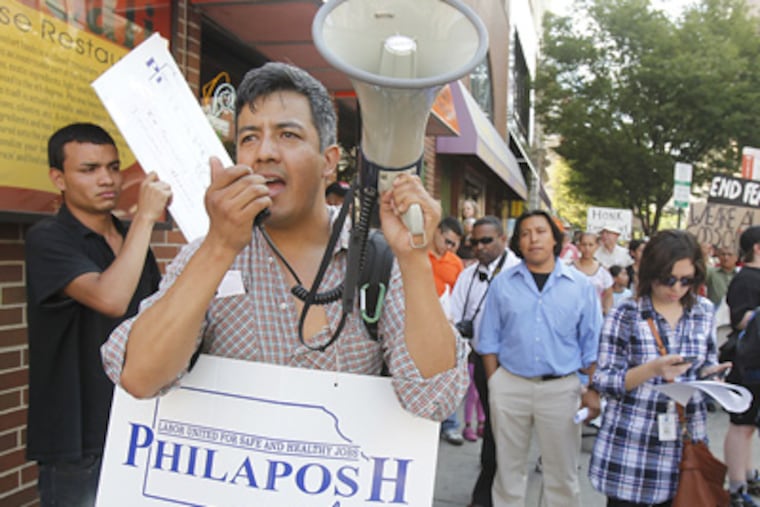Protest against city program that advocates for undocumented say can result in deportations
Outside the Immigration Court building at Ninth and Market Streets on Wednesday, about 100 demonstrators knelt on the sidewalk in memory of recent deportees, whose names they wore on string-and-paper necklaces.

Outside the Immigration Court building at Ninth and Market Streets on Wednesday, about 100 demonstrators knelt on the sidewalk in memory of recent deportees, whose names they wore on string-and-paper necklaces.
It was just one stop in a mile-long walk to increase public pressure on Mayor Nutter to end a program in which the Philadelphia police share the names of the people they arrest - and their country of origin - with federal immigration authorities.
Advocates for immigrants say the voluntary agreement, signed in 2008, can result in deportations even when the original criminal charges are dismissed.
The perception in immigrant communities that local police are acting in concert with Immigration Customs and Enforcement (ICE) only adds to the problem, they say.
"That makes it harder for police to do their jobs . . . and less safe for everyone," said Jen Rock, codirector of New Sanctuary Movement of Philadelphia, the interfaith coalition that sponsored "Walk a Mile in Our Shoes," from LOVE Park to the Liberty Bell and back to City Hall.
In a nonbinding resolution in June, City Council unanimously opposed renewing the arrangement, which gives ICE agents access to the city's Preliminary Arraignment Reporting System.
Everett Gillison, deputy mayor for public safety, said Philadelphia was "on track to renew" the PARS agreement at the end of this month, with the possibility of some slight modifications.
Councilwoman Maria Quiñones Sánchez, he said, has suggested revising the contract by releasing the data to ICE through the Common Pleas Court case-management system, rather than through police. That possibility will be considered, he said, when he meets soon with the PARS committee that includes District Attorney Seth Williams and Municipal Court Judge Marsha Neifeld.
Under pressure from protesters, the city amended the PARS agreement last year to exclude victim and witness data, but immigrant advocates say victims remain reluctant to report crimes for fear of deportation.
At the brightly painted Friendship Arch in Chinatown, protesters heard Teresa, a 50-year-old Mexican woman who declined to give her last name, describe her 25-year-old son as "a smart kid who did well in school . . . and suffered a lot" since being deported in 2009. In an interview later, she said she brought him to America when he was 2. He was deported, she said, after being arrested for assault for trying to get back money he was owed. That case was dismissed, she said, but the arrest set him up for expulsion.
Unlike "Secure Communities" - a mandatory federal program that uses local and state fingerprint data to identify people with prior immigration violations - PARS is a voluntary program that lists people in police custody at any moment.
"Because PARS includes country of origin," said Rock, "ICE can interview every single person in police custody who was born in a different country, whether or not that person has had any previous contact with Immigration."
What "people see on the ground," she said, leaves the impression "that police work for Immigration. The way to change that perception is to end this contract."
While ICE is supposed to target the most dangerous immigrants, activists say it has acted overzealously, snaring undocumented but otherwise law-abiding people. A report this month by the American Immigration Lawyers Association, titled "Immigration Enforcement, Off Target: Minor Offenses With Major Consequences," looked at 127 cases, including nine from Pennsylvania and seven from New Jersey.
"As a whole," the report concluded, "the cases starkly illustrate how individuals who represent . . . no risk to public safety are nevertheless being funneled into the removal process."